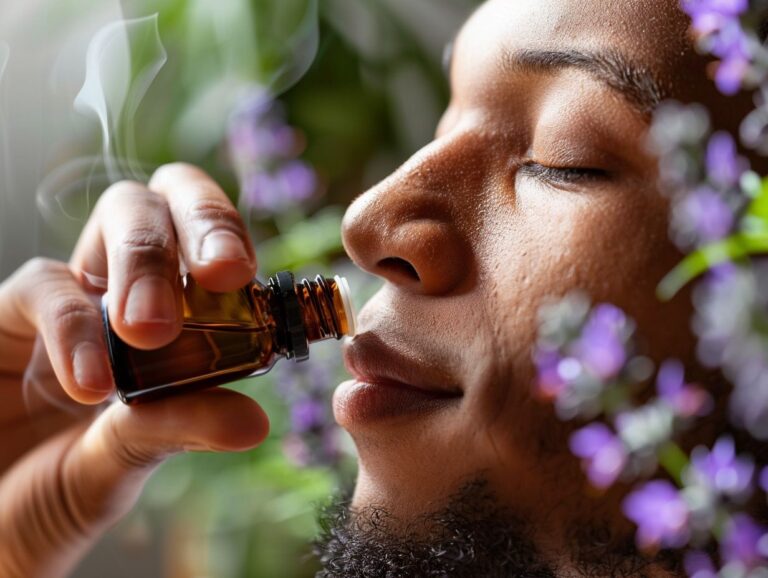Can Aromatherapy Help Asthma
Are you looking for natural ways to manage your asthma symptoms? Aromatherapy could be the answer you’ve been seeking.
In this comprehensive guide, we will explore the world of aromatherapy and its benefits for asthma.
From reducing inflammation to relieving congestion, we will discuss how essential oils can improve your breathing and overall well-being.
Discover which essential oils are most beneficial for asthma, as well as how to safely incorporate aromatherapy into your asthma management plan.
Let’s dive in and explore the power of aromatherapy for asthma relief.
Key Takeaways:
What Is Aromatherapy?
Aromatherapy is a holistic healing treatment that uses natural plant extracts to promote health and well-being. It aims to enhance physical and emotional health through the inhalation or topical application of essential oils derived from various plants.
By leveraging the therapeutic properties of these essential oils, aromatherapy can help alleviate a wide range of conditions such as stress, anxiety, insomnia, and even certain physical ailments. The practice of aromatherapy operates under the principle that specific scents can trigger the body’s innate healing mechanisms and promote relaxation.
Essential oils are carefully selected for their unique properties, and each oil offers distinct benefits. For instance, lavender oil is popular for its calming effects, while peppermint oil is known for its invigorating properties.
How Does Aromatherapy Work?
Aromatherapy works by harnessing the medicinal properties of essential oils extracted from plants. These oils are then inhaled, absorbed through the skin, or ingested to stimulate various physiological responses in the body.
When inhaled, the aromatic molecules from essential oils travel through the olfactory system and activate the brain’s limbic system, which is responsible for emotions, memories, and behaviors.
Essential oils can also be absorbed through the skin during massages or bath soaks. Once absorbed, they can enter the bloodstream and interact with different body systems, such as the endocrine and nervous systems, influencing hormone levels, stress responses, and more.
When essential oils are used in oral preparations under professional guidance, they can directly affect the digestive system, immune responses, and microbial balance in the body.
What Are Essential Oils?
Essential oils are concentrated extracts derived from plants that capture the plant’s scent, flavor, and beneficial properties. They contain the essence of the plant from which they are derived and are used in aromatherapy for their healing and aromatic qualities.
These oils are obtained through various extraction methods such as distillation, cold pressing, or solvent extraction. The purity and quality of essential oils are crucial for their effectiveness in promoting physical and emotional well-being. Each essential oil has its unique set of properties, ranging from calming lavender to invigorating peppermint.
When used in aromatherapy, these oils can help alleviate stress, enhance mood, promote relaxation, and even boost the immune system. The therapeutic benefits of essential oils have been recognized for centuries, making them an integral part of natural healing practices.
What Are the Benefits of Aromatherapy for Asthma?
Aromatherapy offers several potential benefits for asthma patients, including reducing inflammation in the airways, improving lung function, and providing a natural alternative to traditional inhalers. By using essential oils, aromatherapy can help alleviate respiratory symptoms and provide relief during asthma exacerbations.
One of the advantages of incorporating aromatherapy into asthma management is the diverse range of essential oils available, each with unique therapeutic properties that can target specific symptoms. For example, lavender oil is known for its calming effects, which can help reduce stress-induced asthma attacks. Peppermint oil, on the other hand, has menthol that can act as a natural decongestant, aiding in opening up the airways.
Another benefit is the non-invasive nature of aromatherapy, making it a gentle option for individuals who may experience sensitivities or adverse reactions to conventional asthma medications. This natural approach can complement traditional treatments, offering patients a holistic way to manage their condition. The relaxing scents from essential oils can promote better sleep quality, which is crucial for asthma control as proper rest can help prevent exacerbations.
Reduces Inflammation
Aromatherapy has been shown to help reduce inflammation in the airways of asthma patients, potentially easing bronchoconstriction and promoting better respiratory function.
Essential oils like Eucalyptus, Peppermint, and Lavender are known for their anti-inflammatory properties, making them popular choices in aromatherapy for asthma management. When these oils are inhaled, they can target the inflamed airways, providing relief from symptoms such as coughing and shortness of breath.
Research has demonstrated that the vaporization of specific essential oils can help decrease asthma-related inflammation. For instance, a study published in the Journal of Asthma found that inhaling a blend of Eucalyptus and Frankincense oils reduced airway resistance in asthma patients.
Relieves Congestion
Aromatherapy can aid in relieving congestion in asthma patients by using specific essential oils known for their decongestant properties, helping to clear the airways and improve breathing.
Regarding selecting essential oils for decongestant effects, eucalyptus oil is a popular choice due to its ability to open up the air passages. Another effective option is peppermint oil, which has cooling properties that can help soothe inflamed respiratory tissues. Tea tree oil is also beneficial as it possesses antimicrobial properties that can assist in reducing respiratory infections.
Inhalation is the most effective way to reap the benefits of these oils – you can add a few drops to a bowl of steaming water or use a diffuser to disperse the aroma. Gentle inhalation techniques like deep breathing can further enhance the decongestant effects, providing relief for asthma patients.
Improves Breathing
Aromatherapy interventions have been associated with improved breathing patterns in asthma patients, promoting better airway function and enhancing overall respiratory wellness.
Incorporating aromatherapy techniques into daily routines can be highly beneficial for individuals with asthma. Essential oils such as eucalyptus, peppermint, and lavender have been found to possess anti-inflammatory and bronchodilator properties, helping to alleviate respiratory symptoms. When used in conjunction with breathing exercises, aromatherapy can further improve lung function and reduce the frequency of asthma attacks. It is important to consult with a qualified healthcare provider to determine the most suitable essential oils and techniques for effective asthma management.
Reduces Stress and Anxiety
Aromatherapy has the potential to reduce stress and anxiety levels in asthma patients, offering a holistic approach to managing emotional well-being alongside respiratory health.
Research has shown that certain essential oils have soothing properties that can help alleviate anxiety and promote a sense of calmness. For asthma patients, who often experience heightened emotional distress due to their condition, incorporating aromatherapy into their daily routine can be incredibly beneficial.
Creating a relaxing atmosphere with the use of essential oils such as lavender, eucalyptus, or peppermint through diffusers or inhalers can provide a sanctuary for asthma patients to unwind and de-stress. These scents not only have a pleasant aroma but also contain compounds that can positively influence emotions and mental well-being.
It is important to note that while aromatherapy can be a helpful adjunct therapy for asthma patients, it should not replace traditional medical treatments. Consulting with a healthcare provider and an experienced aromatherapist can ensure safe and effective integration of aromatherapy into an asthma care plan.
Which Essential Oils Are Beneficial for Asthma?
Several essential oils have shown promise in managing asthma symptoms, including peppermint oil, eucalyptus oil, lavender oil, and tea tree oil. These oils possess properties that can help alleviate respiratory distress and promote airway health.
Peppermint oil is known for its menthol content which provides a cooling sensation and may help improve breathing by relaxing the airways.
Eucalyptus oil, with its eucalyptol component, serves as a decongestant that can reduce inflammation and clear mucus.
Lavender oil’s calming effects may assist in relieving stress-related asthma symptoms, offering relaxation and potentially improving airflow.
Tea tree oil, recognized for its antimicrobial properties, can support respiratory health by warding off infections and reducing inflammation.
Peppermint Oil
Peppermint oil is known for its cooling and soothing properties, making it a popular choice for managing asthma symptoms through inhalation. Its menthol content can help open up the airways and improve breathing.
When peppermint oil is vaporized and inhaled, its menthol component acts as a natural decongestant, reducing inflammation in the respiratory tract. This can provide relief from asthma symptoms such as shortness of breath and wheezing, making it easier for individuals to breathe comfortably. The aromatic compounds in peppermint oil can have a calming effect, helping to alleviate stress and anxiety often associated with asthma exacerbations.
Eucalyptus Oil
Eucalyptus oil is valued for its decongestant properties, making it effective in reducing respiratory congestion in asthma patients when inhaled. It can also assist in clearing the airways for improved breathing.
One of the most common methods for inhaling eucalyptus oil is through steam inhalation. By adding a few drops of eucalyptus oil to a bowl of hot water and covering your head with a towel to trap the steam, you can benefit from its decongestant effects.
Using eucalyptus oil in a diffuser can help to purify the air in your environment, promoting better respiratory function. Its anti-inflammatory properties also make it a popular choice for managing asthma symptoms naturally.
Lavender Oil
Lavender oil is known for its calming and anti-inflammatory properties, which can help reduce airway inflammation and promote relaxation in asthma patients when applied topically or inhaled.
Studies have shown that the scent of lavender oil can have a soothing effect on individuals experiencing respiratory symptoms, providing relief from congestion and easing breathing difficulties. Its anti-inflammatory compounds can help decrease the inflammation in the airways, potentially reducing the severity of asthma attacks. For topical application, diluting a few drops of lavender oil with a carrier oil and massaging it onto the chest or back can aid in opening up the air passages and improving respiratory function.
Tea Tree Oil
Tea tree oil exhibits antimicrobial and expectorant properties, offering benefits for asthma patients by supporting respiratory health and providing relief from cough and congestion when diffused.
The antimicrobial properties of tea tree oil help to combat bacteria, viruses, and fungi that may exacerbate respiratory issues in asthma patients. Its expectorant qualities aid in loosening mucus buildup, making it easier for individuals to clear their airways.
When used in diffusers, tea tree oil can effectively purify the air and reduce airborne pathogens, promoting a cleaner and healthier environment for those with asthma.
To incorporate tea tree oil for respiratory support, try adding a few drops to a bowl of hot water and inhaling the steam, or dilute it in a carrier oil for chest rubs to alleviate symptoms and promote easier breathing.
How to Use Aromatherapy for Asthma?
Aromatherapy can be utilized for asthma management through various methods, including inhalation, topical application, diffusion, and bathing. Each approach offers unique benefits in supporting respiratory health and promoting overall well-being.
Regarding inhalation, one popular method is direct inhalation. This involves adding a few drops of essential oils to a cloth or tissue and breathing in the vapors. Another option is using a diffuser, which disperses essential oils into the air for inhalation. Topical application involves diluting essential oils with a carrier oil and applying the mixture to the skin, such as the chest or back.
For diffusion, you can use an aromatherapy diffuser to disperse essential oils throughout a room. This method allows for continuous inhalation of the oils, which can help with respiratory symptoms. Regarding bathing, adding a few drops of essential oils to a warm bath can create a soothing and therapeutic experience.
It is essential to exercise caution when using aromatherapy for asthma. Always consult with a healthcare professional before starting any new treatment. Make sure to follow proper dosage recommendations for each method to avoid any adverse effects.
Inhalation
Inhalation is a common method of using aromatherapy for asthma relief, as it allows essential oils to directly enter the respiratory system, providing quick relief from symptoms such as congestion and breathlessness.
Essential oils used in inhalation therapy have been shown to have anti-inflammatory and bronchodilator effects, which can help widen the airways and reduce inflammation in the lungs, making breathing easier for asthma sufferers. The rapid absorption of these oils through inhalation means that the effects are felt almost immediately, providing almost instant relief during asthma attacks.
To maximize the benefits of inhalation therapy, it is important to use a proper inhalation technique. This involves adding a few drops of the chosen essential oil to a bowl of hot water or using a diffuser to disperse the oil molecules into the air. Taking slow, deep breaths while inhaling the aromatic steam can help the oils reach deep into the lungs, where their healing properties can take effect.
Topical Application
Topical application of essential oils in aromatherapy for asthma involves diluting oils with carrier oils and applying them to the skin. This method can provide localized relief and promote respiratory comfort.
Carrier oils play a crucial role in this process, as they help to safely deliver the potent essential oils to the skin without causing any irritation. Some recommended carrier oils for asthma management include coconut oil, almond oil, and jojoba oil due to their gentle nature and skin-nourishing properties.
Direct skin contact with essential oils not only allows for quick absorption but also enables the aromatic compounds to directly target the respiratory system, offering immediate support during asthma symptoms. This direct method is especially beneficial for individuals seeking fast-acting relief and enhanced respiratory function.
Diffusion
Diffusion is a popular method of dispersing essential oils in the air for asthma relief and respiratory support. Using diffusers can create a calming atmosphere and promote better breathing for asthma patients.
Diffusion offers a non-invasive way to reap the benefits of aromatherapy, which is known for its therapeutic effects on respiratory conditions like asthma. By diffusing essential oils, the micro-particles enter the air and are easily inhaled, allowing the body to absorb their natural properties. This gentle method is particularly beneficial for individuals with sensitive respiratory systems, as it avoids direct contact with potentially irritating substances.
There are various types of diffusers available, such as ultrasonic, nebulizing, heat, and evaporative diffusers. Ultrasonic diffusers use water to disperse essential oils in a fine mist, while nebulizing diffusers break oils into droplets without altering their chemical composition.
When choosing essential oils for diffusion to support respiratory well-being, consider options like peppermint, eucalyptus, lavender, and tea tree oil. Peppermint oil can help clear nasal passages, while eucalyptus has decongestant properties. Lavender promotes relaxation, and tea tree oil is known for its antimicrobial effects.
Bathing
Bathing with essential oils in aromatherapy can be a soothing and therapeutic experience for asthma patients, offering relaxation and respiratory support. Adding oils to bathwater can help alleviate stress and promote overall well-being.
Aromatherapy baths can also aid in clearing congestion and opening up airways, making breathing easier for individuals with asthma. The gentle scents of essential oils can have a calming effect on the mind, reducing anxiety and promoting better sleep patterns. When selecting oils for baths, it’s essential to choose ones with anti-inflammatory properties, such as eucalyptus or peppermint, known for their respiratory benefits.
Are There Any Risks or Side Effects of Aromatherapy for Asthma?
While aromatherapy is generally considered safe for asthma patients, there are potential risks and side effects to be aware of. These may include allergic reactions, respiratory irritation, or interactions with medications, emphasizing the importance of consulting a healthcare provider before starting aromatherapy.
Some essential oils used in aromatherapy may trigger allergic reactions in sensitive individuals, leading to symptoms such as skin rashes, itching, or even respiratory distress. Certain oils, particularly when inhaled, can cause irritation to the airways, exacerbating asthma symptoms rather than alleviating them.
It is crucial for individuals with allergies or pre-existing respiratory conditions to exercise caution when using aromatherapy. Consulting with a healthcare professional prior to incorporating aromatherapy into your asthma management plan is advised to ensure compatibility with your specific health needs.
Frequently Asked Questions
Can Aromatherapy Help Asthma?
Yes, there is evidence that suggests aromatherapy can help relieve symptoms of asthma.
What is Aromatherapy?
Aromatherapy is a holistic healing treatment that uses natural plant extracts, such as essential oils, to promote health and well-being.
How does Aromatherapy help Asthma?
Aromatherapy can help asthma by reducing stress and anxiety, easing breathing difficulties, and promoting relaxation of the airways.
Which essential oils are effective for Asthma?
Peppermint, eucalyptus, lavender, and tea tree essential oils have shown to be effective in managing asthma symptoms.
How should I use Aromatherapy for Asthma?
Aromatherapy can be used through inhalation, massage, or adding essential oils to bath water. It is important to consult with a certified aromatherapist for proper dosage and application.
Is Aromatherapy safe for children with Asthma?
Some essential oils may not be safe for children, so it is important to consult with a pediatrician and certified aromatherapist before using aromatherapy for children with asthma.







4 Comments